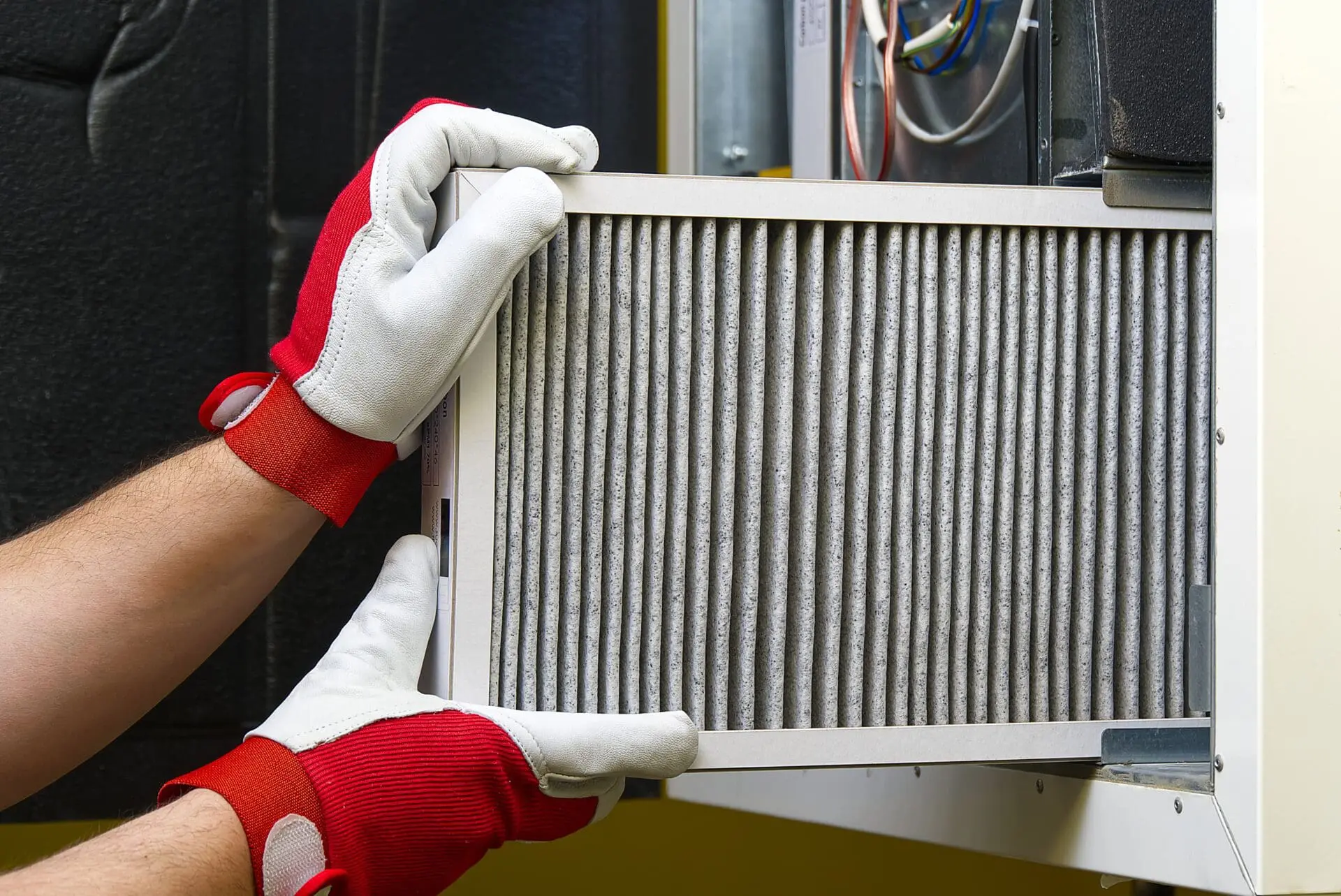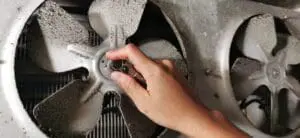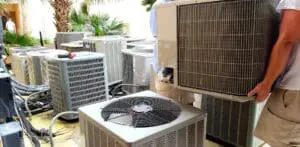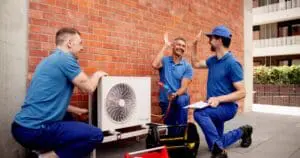Walk into any office building, and you’ll probably notice the quiet hum of an HVAC system at work. But when the air filters clog up, the air can feel heavier, dust settles faster, and the system works harder to keep everyone comfortable.
Keeping up with air filter maintenance might not sound exciting, but it’s one of those behind-the-scenes tasks that keep a building running smoothly. Clean filters protect indoor air quality, help your commercial HVAC system stay efficient, and make the work environment healthier for everyone who spends their day inside.
In this post, we’ll break down how air filters function in commercial buildings, what happens when maintenance slips, and how to set up a schedule that fits your facility’s needs.
Table of Contents
What Role Do Air Filters Play in Office HVAC Systems?
Air filters are the unsung heroes of an office building’s ventilation system. They pull in outside air, trap particles, and circulate clean air throughout the workspace. In an office setting, filters are great at capturing dust, pollen, and volatile organic compounds (VOCs) from cleaning supplies or office equipment.
Most commercial HVAC systems are designed to run constantly during business hours, which means those filters take in a lot of air. When filters are clean, airflow moves freely, helping maintain a comfortable temperature and steady ventilation throughout the building.
According to the EPA’s guide to indoor air quality, ventilation, filtration, and maintenance all work together to keep air safe to breathe. Neglect one, and the whole system struggles.
That’s why regular air filter maintenance is so essential. When filters are neglected, airflow slows, pollutants accumulate, and indoor air quality (IAQ) declines, all of which can make the workspace feel stale or uncomfortable.
So if your air feels “off,” or your vents are kicking up more dust than usual, it might be time to check your filters.
Why Clean Filters Matter: Key Benefits
Air filters don’t need a lot of attention, but they do need consistency. It might seem like a small thing to replace or clean them on time, but regular maintenance can benefit an office building more than you’d think. Here’s how:
Health & Comfort of Occupants
Air quality directly affects how people feel during the day. Clean filters protect indoor air quality (IAQ) in offices by reducing fine particles such as dust, pollen, and even printer emissions that circulate through the air. Over time, that can lead to itchy eyes, irritated sinuses, or that “stale air” feeling that no one can quite put their finger on.
Air filter maintenance helps keep those particles out of the air and out of employees’ lungs. It’s an easy way to make a real difference in comfort and focus throughout a workday.
Energy Efficiency & Cost Savings
When filters clog, the HVAC system has to work harder to move air. That extra effort increases what’s called “pressure drop”—basically, resistance inside the system that makes fans and air handlers work overtime.
It’s kind of like breathing through a straw. The system can do it, but it takes a lot more effort. The result? Higher energy bills and a system that wears down faster than it should.
Equipment Longevity & Maintenance Avoidance
When filters are left in too long, dust and debris start sneaking past them. That buildup ends up coating coils, fans, and ductwork—parts that aren’t meant to handle that much grime. Eventually, efficiency drops, components wear out faster, and maintenance gets more expensive.
Changing filters on schedule is a simple form of preventive maintenance. It protects the more delicate parts of the system, reduces the need for emergency service calls, and helps you get more years out of your HVAC equipment.
Risks of Neglecting Filter Maintenance
Skipping air filter maintenance doesn’t cause problems right away—that’s what makes it so easy to overlook. But give it a few months, and small issues start piling up.
You’ll see signs like:
- Weak or uneven airflow from vents
- Dust is collecting faster on surfaces
- Rising energy bills without a clear cause
- Employees complaining about stuffy or dusty air
Beyond comfort, there’s also the bigger picture: poor indoor air quality can affect health and productivity while also increasing wear and tear on your HVAC system.
For example, many office buildings delay filter changes for an extra quarter to save costs. However, by the end of that period, complaints about dust and odors increase, as well as the building’s energy usage. Maintaining a consistent schedule helps prevent these problems before they start and keeps your building comfortable year-round.
How to Determine the Right Filter Change Schedule
Every building is a little different, so there’s no universal HVAC filter replacement schedule. The right schedule depends on factors like system design, occupancy levels, and what’s happening outside the building. A property near a busy road or construction zone, for example, will usually need more frequent filter changes than one in a quieter area.
Here are a few key factors to consider when setting your filter maintenance plan:
- Filter efficiency: Filters with higher MERV ratings capture finer particles but can clog faster, especially in dusty environments.
- Building use and hours: Offices that run their HVAC systems around the clock will need more frequent replacements.
- Outdoor air quality: Pollution, pollen, and nearby traffic all affect how quickly filters fill up.
- Indoor activities: Printing, cleaning products, and certain office equipment can release particles that strain filters.
Facility teams can track filter performance using simple methods, such as measuring pressure drop across the filter or performing visual inspections during routine service. Most standard office environments benefit from a three-to-four-month replacement cycle, but heavy-use or high-dust spaces may need changes monthly.
Regular checks keep your commercial HVAC maintenance plan predictable and help prevent airflow issues before they become costly.
Seeing These Signs?
Don’t ignore the warning signs. Contact HVAC professional today!
Best Practices for Air Filter Maintenance in Office Buildings
Getting the most out of your air filters isn’t complicated, it just takes a bit of structure and consistency. Here’s what that looks like in practice:
Selecting the Right Filter
Choose filters that fit your system and meet your air quality goals. Start by checking your system’s requirements—you want to make sure you match the correct MERV rating for your office HVAC unit.
A MERV rating between 8 and 13 typically balances efficiency with airflow in office environments. Go too high, and you can restrict air movement; too low, and you won’t catch enough fine particles.
Proper Installation & Inspection
Even the best filter won’t work if it’s installed incorrectly. Check for gaps and ensure the filter is facing the right direction. A quick inspection during each maintenance cycle can help catch any loose or damaged filters early.
Creating a Maintenance Schedule & Log
A written schedule keeps teams accountable and makes inspections easier to track. Note when filters were changed, who did it, and what type was used. This simple documentation habit supports preventive HVAC maintenance and keeps the building’s air quality consistent.
Training and Collaboration Between Facility Managers and Occupants
Facility managers can help occupants understand how their actions impact IAQ. For example, reporting strange smells, blocked vents, or extra dust helps identify problems early. Collaboration keeps the whole building environment healthier.
Monitoring and Continuous Improvement
Indoor air quality changes over time. Keep an eye on performance data, schedule occasional IAQ tests, and adjust your plan as needed. If you want a deeper look at overall air improvement methods, check out our guide on enhancing air quality in commercial properties.
Contact Andrew’s for Air Filter Maintenance
Clean filters may not be the most visible part of your building, but they play a huge role in keeping the air fresh, systems efficient, and maintenance costs under control. Proactive air filter maintenance promotes a healthier, more productive workplace while saving you from the headaches that come with clogged filters and poor airflow.
If it’s been a while since your last service or you’re not sure when your filters were last checked, it might be time to get on a schedule. The team at Andrew’s can help assess your system, set up a maintenance plan, and make sure your filters are doing their job.
Ready to get started? Schedule a service request today and keep your office HVAC system running at its best.




